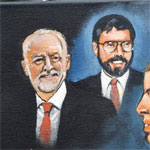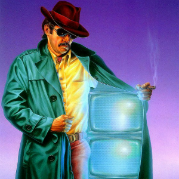|
Well strictly speaking Barthes, like many literary critics, sort of arbitrarily defined terms. The "author" in his mind was the singular individual 'genius' who created a piece of art as an act of original insight, which he imagined was not actually possible anymore (if it ever was) So that particular aspect is dead. There is no 'originality', all work is merely restructuring of what comes before it, as part of the collective psyche/literary body that already exists. The scriptor may put different window dressing on it, but the basic concept is that there is nothing new under the sun. It's sort of the critical equivalent of Holden Caulfield screaming "Phony!" at everyone. It's somewhat ironic then that Death of the Author also applies to him and people have largely dropped this in favour of what you describe. Death of the Author is a useful tool though, as long as it's used much as you describe: The work is going to outlive the person who created it, so perhaps the best way of looking at it is to assume that the author itself can offer no meaningful insight into what it means because, for the vast majority of the work's life, that will be the case. This can lead to somewhat arrogant situations where authors themselves are told they have nothing insightful to say about something they created, which may actually be the case if you view the unconscious bias as being more important in shaping the work than the actual conscious efforts taken. Many people use Death of the Author to mean "The creator has no influence on the creation" which is patently absurd, even if you do take a hardline stance.
|
|
|
|

|
| # ? Apr 27, 2024 05:42 |
|
computer parts posted:Context works both ways, it's not just "I like this art but the guy who wrote it is a baddie".
|
|
|
|
Death of the author is helpful because artists can either be terrible liars, or unaware of their own subconscious hypocrisy, e.g. Orson Scott Card's public homophobia against the gay subtext that crops up in his works.
|
|
|
|
if someone wrote an essay about homosexual subtext in enders game without discussing the possibility that the authors mormonism might be why its not text, I think that would be pretty useless I don't think that the author should be even close to the only thing considered, and I especially don't think that their publicly stated opinions about their work should be treated as particularly special, but I do think for any kind of in-depth analysis of anything beyond pure aesthetics you have to at least bear in mind some of the cultural context
|
|
|
|
XMNN posted:if someone wrote an essay about homosexual subtext in enders game without discussing the possibility that the authors mormonism might be why its not text, I think that would be pretty useless So basically you're saying that if people think that the content of an artist's work is contradictory to their own stated beliefs/intent, we should excuse them because of their cultural surroundings?
|
|
|
|
Excuse what? Ender's Game apparently has a lot of homoerotic subtext in it. I think it is a pretty reasonable assumption that the author's (probably) being a repressed homosexual might be somehow connected to that subtext. E: like even by acknowledging his public homophobia in your post you are involving the author in a discussion their work. Beyond "there is gay subtext" what discussion is there to have if we have to pretend that we don't know that the author is a homophobic Mormon? XMNN fucked around with this message at 11:55 on Apr 3, 2016 |
|
|
|
But do you need to make an assumption of repressed homosexuality to be able to read that subtext? Suppose you're wrong, and that that subtext exists only because it's the result of a cultural clash. Would that invalidate that subtext? I think the more interesting question is why it would speak to you that way. If art is communicative, then you can't kill the author. If art is self-reflective, then you must. Can it be both? A contradiction, but that's where we have to start.
|
|
|
|
A clash between which cultures?
|
|
|
|
Another example I usually think of is satire. How does one label satire without authorial intent?
|
|
|
|
XMNN posted:A clash between which cultures?
|
|
|
|
Exactly, we would have to look at the author's cultural context in our analysis.
|
|
|
|
RagnarokAngel posted:Another example I usually think of is satire. How does one label satire without authorial intent? Do you need to know anything about Paul Verhoefen to realise that Robocop is a satire?
|
|
|
|
XMNN posted:if someone wrote an essay about homosexual subtext in enders game without discussing the possibility that the authors mormonism might be why its not text, I think that would be pretty useless So, essentially, because homosexuality as a concept capable of bearing a term like "homoeroticism" didn't exist until the middle of the 19th century, a paper on homoerotic elements in Arthuriana couldn't go any further back than Tennyson? I think this is patently absurd, to think that when a reader interprets Sir Lancelot being mistaken for a knight's wife and being embraced and kissed as a homoerotic moment, they are absolutely and totally wrong.
|
|
|
|
Samuel Clemens posted:Do you need to know anything about Paul Verhoefen to realise that Robocop is a satire? Do you need to know anything about Jack Chick to realize that Dark Dungeons isn't a satire?
|
|
|
|
Samuel Clemens posted:Do you need to know anything about Paul Verhoefen to realise that Robocop is a satire? A lot of people were fooled by Starship Troopers.
|
|
|
|
Brainiac Five posted:So, essentially, because homosexuality as a concept capable of bearing a term like "homoeroticism" didn't exist until the middle of the 19th century, a paper on homoerotic elements in Arthuriana couldn't go any further back than Tennyson? I think this is patently absurd, to think that when a reader interprets Sir Lancelot being mistaken for a knight's wife and being embraced and kissed as a homoerotic moment, they are absolutely and totally wrong. I'm not aware of any living school of literary criticism that claims that a work cannot develop meaning beyond the intent of the artist. e: To expand, death of the author does not propose that the audience can find meaning in a work. This is a basic conceit of criticism itself. What death of the author proposes is that any meaning ascribed to a work by its author does not exist, because works have no author. It does not expand the pool of a work's possible meanings. It only limits it. The Larch fucked around with this message at 16:02 on Apr 3, 2016 |
|
|
|
The Larch posted:I'm not aware of any living school of literary criticism that claims that a work cannot develop meaning beyond the intent of the artist. Well, "The Larch", I am not writing words at schools of literary criticism, I am responding to a specific post that claims that to be anything other than superficial analysis must rely on the cultural context of the original text.
|
|
|
|
Brainiac Five posted:Well, "The Larch", I am not writing words at schools of literary criticism, I am responding to a specific post that claims that to be anything other than superficial analysis must rely on the cultural context of the original text. That's not what the post said. Wait, hold on, I recognize this style of writing. Hi Effectronica.
|
|
|
|
The Larch posted:That's not what the post said. Oh, go ahead and write what the post actually said. In the meantime, I'll take a look at your edit. The Larch posted:e: To expand, death of the author does not propose that the audience can find meaning in a work. This is a basic conceit of criticism itself. What death of the author proposes is that any meaning ascribed to a work by its author does not exist, because works have no author. It does not expand the pool of a work's possible meanings. It only limits it. Actually, the original essay doesn't say that. Perhaps Barthes wrote a sequel. Here is a passage from it: quote:Once the Author is gone, the claim to “decipher” a text becomes quite useless. To give Barthes argues that texts do not have a singular meaning which can and is to be deciphered, and this idea is the foundation of his assault upon the author, or Author. Barthes's argument is once again made clear in the closing sentences: quote:In this way is revealed the whole being of writing: a text consists of Your interpretation is, I suspect, drunk directly from the cups of Camille Paglia or some other knee-jerk respondent, for you see, to Barthes the text consists of a multiplicity of meanings, which does not exclude those intended by the author anywhere in the essay, but which are only understandable in the reading of the text itself. That is, you are quite wrong, but many before you have suffocated in such sentences and many after you will suffocate too. Don't feel ashamed.
|
|
|
|
The Larch posted:That's not what the post said.
|
|
|
|
I ran into this headfirst while listening to Death's Spiritual Healing album. Specially the song about abortion, one of the best tracks of the album (https://www.youtube.com/watch?v=4K3Hf6ekZr0), but seriously made me consider my stance on the authors. Trying to figure out what the message was, it seemed to suggest a rather conservative point of view, talking about punishing 'those taking lives'. Thinking this over i decided that i actually enjoyed thinking it over. In conclusion, A good band made me think about stuff, if i don't agree with death metal lyrics that is fine/expected, and i still enjoy it all. Sorry it's not shakespeare or whatever E: I suppose listening to death metal trains someone to seperate author from the art pretty effectively. A lot of stuff is really out there lyrically, but the music can be so extremely satisfying that you look past whatever you don't agree with personally. heard u like girls fucked around with this message at 01:08 on Apr 4, 2016 |
|
|
|
XMNN posted:Exactly, we would have to look at the author's cultural context in our analysis.
|
|
|
|
What if Michael Jackson actually abused some children, would that change your opinion of the music he made? Can you watch the Bill Cosby show and still laugh at the jokes, even if the man was a rapist?
|
|
|
|
Guilty as charged, OP.  Ambitious Spider posted:Depends on the difference between how much I like something and how terrible the person was. Like orson Scott card is a poo poo heel and actually actively being terrible towards gay people, so gently caress him. I didn't see the ender movie despite how much I liked those books as a kid Yeah, Lovecraft was hilariously racist. He even named his cat "friend of the family Man" and had a paranoia of black people and sailors in particular. It's pretty Teriyaki Koinku fucked around with this message at 03:03 on Apr 4, 2016 |
|
|
|
The questions of whether art can be appreciated while recognizing that the artist is a bad person and the questions of how authorial intent factors into the interpretation of work are very different, so I think it's at least safe to say that "separating the art from the artist" is too vague of a term by itself.
|
|
|
|
Ok how does it work with a product that isn't art? Like chick-fil-a? Pretty tasty fast food chicken but I can't in good conscious give money to someone financially supporting literal Ugandan death squads for gay people( or at least financially supporting those anti-gay politicians who support the death squads)
|
|
|
|
|
If Chick-fil-a, how about Coca-cola and financially supporting literal Latin American death squads for trade unionists? Or to put it in a more constructive form, is what they overtly do as a product/artistic value different to what they covertly do with the money you have given them?
|
|
|
|
Chocolate Teapot posted:Death of the author is helpful because artists can either be terrible liars, or unaware of their own subconscious hypocrisy, e.g. Orson Scott Card's public homophobia against the gay subtext that crops up in his works. The first thing I thought when I first read about Card's homophobia was "that sure is rich coming from the guy who wrote his most famous book about adolescent boys who spend 70% of the time butt naked." There is just SO MUCH nudity in Ender's Game, it's kind of shocking. Humans Among Us posted:I ran into this headfirst while listening to Death's Spiritual Healing album. Specially the song about abortion, one of the best tracks of the album (https://www.youtube.com/watch?v=4K3Hf6ekZr0), but seriously made me consider my stance on the authors. Trying to figure out what the message was, it seemed to suggest a rather conservative point of view, talking about punishing 'those taking lives'. Woolie Wool fucked around with this message at 22:47 on May 11, 2016 |
|
|
|
Samuel Clemens posted:Do you need to know anything about Paul Verhoefen to realise that Robocop is a satire? No, but arguably -- it helps. "Paul Verhoeven directs satires" is an idea that might transform how you experience Robocop, Starship Troopers, etc. A good place to start clearing out dumb misconceptions about what Barthes meant is to realize he's not only talking normatively, not just about what you should do -- he's talking about what's actually possible. You do not, and never will have direct access to the author's mind. What you have instead is a simulacrum, a set of ideas about what the author probably thought, probably felt, about what happened to the ideas in a story before they reached you. The normative argument, then, is that once you realize this is just an illusion there's no particular reason to esteem it so highly. The more radical part isn't even "disrespecting" (lol) the author, it's the part where he describes fiction as a mirror and a catalyst rather than as a dead thing with a secret hidden inside of it to be dug out and owned. The reader, and the reader's understanding of language and culture at the instant of reading, is what brings a narrative to life. And to bring that back to my answer to Mr. Twain above, if you want to criticize Barthes, you should start with "why should I throw out the simulacrum instead of just being conscious of what it really is and using it anyways?" Tuxedo Catfish fucked around with this message at 00:09 on May 12, 2016 |
|
|
|
I'm super lazy at the moment so I am not going to expand upon this thought in great detail, but how about works where authors depict themselves as characters in their own stories? I'm thinking primarily of Philip K Dick's Valis here.
|
|
|
|
i viewed a work of art once. initially i found it deep and profound that communicated many levels of nuanced meaning to me. then i realized it didn't come with an artist biography so i had no framework to judge its artistic merit. oh well.
|
|
|
|
Luckily there is a solution! https://www.youtube.com/watch?v=8vI-cTiUj7s
|
|
|
|
Brainiac Five posted:So, essentially, because homosexuality as a concept capable of bearing a term like "homoeroticism" didn't exist until the middle of the 19th century, a paper on homoerotic elements in Arthuriana couldn't go any further back than Tennyson? I think this is patently absurd, to think that when a reader interprets Sir Lancelot being mistaken for a knight's wife and being embraced and kissed as a homoerotic moment, they are absolutely and totally wrong. e. To put it another way, "It's not the text, it's you." unlimited shrimp fucked around with this message at 16:29 on May 12, 2016 |
|
|
|
you don't need to know anything about the author to draw meaning from something, there doesn't even need to be an author for people to find meaning in something, people interpret clouds, ink blots, household objects which look kind of like a face etc even though they don't even have a hint of authorial intent. and that's interesting but the only conclusions you can draw from that are about the reader or about how different readers perceive things. which again is interesting but it shouldn't be the end of our analysis of something if a computer or a million monkeys on a million typewriters wrote Shakespeare's sonnets word for word then i just don't think they would be as enjoyable or powerful as when you know some guy 400 years ago was thinking and writing about aspects of the human condition that seem relevant today basically I think communication is something that both parties participate in and entirely discounting one or the other completely misses the point and would make for a fairly boring discussion
|
|
|
|
XMNN posted:you don't need to know anything about the author to draw meaning from something, there doesn't even need to be an author for people to find meaning in something, people interpret clouds, ink blots, household objects which look kind of like a face etc even though they don't even have a hint of authorial intent. and that's interesting but the only conclusions you can draw from that are about the reader or about how different readers perceive things. which again is interesting but it shouldn't be the end of our analysis of something Yes, this. The Death of the Author isn't the last word on this issue in literary theory. There's been a lot of stuff written on the topic since, and most contemporary views have moved away from the idea that meaning is produced entirely by the reader while also maintaining that meaning is not entirely determined by authorial intent. Barthes was being partly polemical when he imagined meaning produced entirely by the reader. He was writing in '60s, after all -- the French weren't very big on authority at the time. Obviously views on this vary a lot, but it's generally accepted that the idea of an author is often indispensable for placing things in their historical or intertextual context. We now just try to move away from naive readings where we try to guess what the actual, living biographical author was thinking in her head when she was writing something and think more about what sort of intent is recoverable from the text itself (since we have access to that) rather than from the brain of the author (which we will never have access to). We can even talk about things that happened in the author's life! We just have to acknowledge that the only way we really know about them is from other texts, not from some sort of magical insight into the author's mental state. And that various social and cultural forces and structures the author wasn't even aware of can condition the form their texts were able to take. And that the intent recoverable from the text may not be in line with all the other possible meanings the text contains. And that that in itself can be meaningful. etc. etc.
|
|
|
|
the trump tutelage posted:It would depend on your thesis. For example, in an essay attempting to contextualize the legends within the society that produced them, talking about Sir Lancelot's homoeroticism is absurd because it's a category of understanding that has no relevance to the author or their society. It imposes a contemporary understanding of sex and eroticism on an ancient, practically foreign text. The most you could say is that a similar scene today would be considered homoerotic, and so what has changed between now and then? It's worth noting here that gay sex didn't just start happening in the last couple of centuries. It has always been possible to write eroticised same-sex relationships (poo poo, look at The Epic of Gilgamesh). It's only that the framework and terminology by which we talk about them is relatively modern, so you'd need to take that into account when examining the history of same-sex intimacy in fiction.
|
|
|
|
Darth Walrus posted:It's worth noting here that gay sex didn't just start happening in the last couple of centuries. It has always been possible to write eroticised same-sex relationships (poo poo, look at The Epic of Gilgamesh). It's only that the framework and terminology by which we talk about them is relatively modern, so you'd need to take that into account when examining the history of same-sex intimacy in fiction. With the earlier Lancelot example, you would also need to make a case that Lancelot being mistaken for a woman and kissed by a man would be cognized as sexual/erotic by its contemporary audience, otherwise I can't imagine what point you'd be trying to argue by labelling it as definitively "homoerotic". Although I guess "Patterns of Behaviour That We Would Consider Sexualized Today But At The Time Were Not Considered Sexual" is not as compelling a paper as "Homoeroticism in the Arthurian Legend."
|
|
|
|
I'd be willing to venture a fiver that there were people back then who would find that hot.
|
|
|
|
Once yall are done with lauteur emorr you should take on no man is an island and think about the fact that things don't have independent existence let alone objective features, and if you pick up a book and say "this is satire" or "this is racist" then you need to have a whole lot of context prepared already
|
|
|
|

|
| # ? Apr 27, 2024 05:42 |
|
If you don't approach literary studies as teleological, then a text is only ever an imperfect mirror for the reader. Criticism is reduced to a verbose form of reading tea leaves.
|
|
|






























